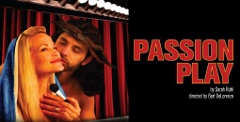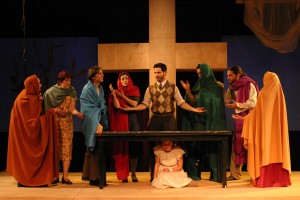AN OCEAN OF TIME
If you ever climb to the top of the Granite Park Chalet trail in Montana, you will find at the end of the hugely winding, desperately steep pathway a log book containing entries by fellow hikers. One of the entries reads something like, “I have come up here every year for the last 40 years. The view has remained the same – but I have changed into something I don’t recognize!”
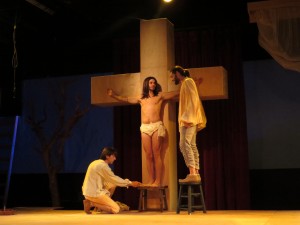 This is a thought that came to my mind while watching Sarah Ruhl’s compelling and sprawling drama about a play which is staged over several hundred years. The play that the various performers enact tells generally the same story – but the contextual environments and trappings could not change more.
This is a thought that came to my mind while watching Sarah Ruhl’s compelling and sprawling drama about a play which is staged over several hundred years. The play that the various performers enact tells generally the same story – but the contextual environments and trappings could not change more.
The play, as you might guess from the title, is the great Passion Play, which tells the story of Christ’s birth and crucifixion. Ruhl’s dynamic piece charts the backstage antics as productions are mounted in four different eras that couldn’t be more different, even though people, their motivations and, yes, their passions, remain the same.
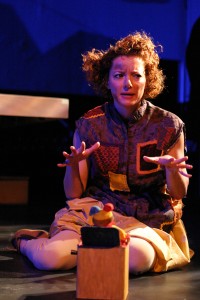 Passion Play opens in 1573 England, as a cast of peasant villagers rehearse for a highly subversive and illegal production of the story of Christ’s birth and crucifixion. It’s illegal, of course, because representations of the religious story come close to being Catholic, which is a burnable offense at the time. Even so, the villagers press on with their performance plans. In this era, with the line between fictional and mystical experience being thin to the point of feathery, the actors cast as the famous Biblical figures start to find themselves “infected” by their roles: The actor playing Jesus (Daniel Bess) is a young fisherman who starts to take on the innocence and idealism of his Messianic character. Meanwhile, his brother (Christian Leffler), who’s playing Pontius Pilate, seethes with bitterness as the villagers clearly start to think of him as being as wicked as the historical tool he’s playing. And the actress playing the Virgin Mary (Dorie Barton) finds herself fearing for her reputation when she discovers that she’s with child.
Passion Play opens in 1573 England, as a cast of peasant villagers rehearse for a highly subversive and illegal production of the story of Christ’s birth and crucifixion. It’s illegal, of course, because representations of the religious story come close to being Catholic, which is a burnable offense at the time. Even so, the villagers press on with their performance plans. In this era, with the line between fictional and mystical experience being thin to the point of feathery, the actors cast as the famous Biblical figures start to find themselves “infected” by their roles: The actor playing Jesus (Daniel Bess) is a young fisherman who starts to take on the innocence and idealism of his Messianic character. Meanwhile, his brother (Christian Leffler), who’s playing Pontius Pilate, seethes with bitterness as the villagers clearly start to think of him as being as wicked as the historical tool he’s playing. And the actress playing the Virgin Mary (Dorie Barton) finds herself fearing for her reputation when she discovers that she’s with child.
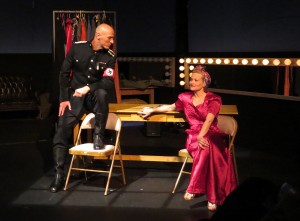 Now the story jumps forward to Oberammergau, Germany, circa 1935, where a village has become famous for its decennial performance of the Passion, which is now being presented in a style that turns it into a propaganda tool for the burgeoning Nazi movement. If Act I channels opuses such as Orlando, the second act is a bit of a throwback to Cabaret. The same actors appear as the same Biblical characters as they did in the Elizabethan Era, but their behind-the-scenes roles are almost incredibly different. Now the actor playing Pilate (still Leffler) quits the play to become a storm trooper, causing heartbreak for his boyfriend, the actor playing Jesus (Bess again), who contemplates leaving the production to find a more meaningful life – as a Gestapo goon.
Now the story jumps forward to Oberammergau, Germany, circa 1935, where a village has become famous for its decennial performance of the Passion, which is now being presented in a style that turns it into a propaganda tool for the burgeoning Nazi movement. If Act I channels opuses such as Orlando, the second act is a bit of a throwback to Cabaret. The same actors appear as the same Biblical characters as they did in the Elizabethan Era, but their behind-the-scenes roles are almost incredibly different. Now the actor playing Pilate (still Leffler) quits the play to become a storm trooper, causing heartbreak for his boyfriend, the actor playing Jesus (Bess again), who contemplates leaving the production to find a more meaningful life – as a Gestapo goon.
The production’s final third thematically seems to cross Sam Shepard’s True West with the Vietnam War movie Coming Home. This time, the action takes place in 1969 South Dakota, as the actor playing Pilate is drafted, while his brother, the actor playing Jesus, opts to head to New York to become an actor. Within a couple of 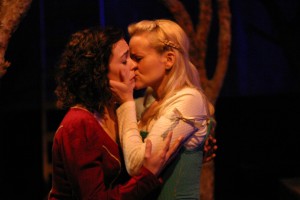 decades, the Jesus is a big time TV star, and Pilate, home from Vietnam, is an emotionally shattered wreck.
decades, the Jesus is a big time TV star, and Pilate, home from Vietnam, is an emotionally shattered wreck.
Director Bart Delorenzo stages the kaleidoscopic goings on with his usual insightful and visually dynamic flair. The production at the Odyssey Theatre is full of glittery touches: Fantasy sequences in which glowing fish kites are carried around the stage like they’re adrift on a timeless sea; or a scene taking place in the eerie emptiness of a South Dakota highway toll booth, created with wind effects and a single light.
Interestingly, DeLorenzo appears to have gone with the notion that the work consists of three separate, if thematically linked plays. The Elizabethan act is staged with the mood of a Medieval Pageant, while the sequences taking place in Germany possess the deftly evoked suspense of something vile lurking just offstage. By contrast, the 20th century sequences boast a gentler, almost elegiac mood that’s fraught with melancholy.
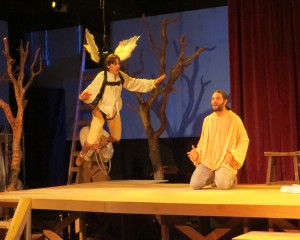 But one finds oneself particularly intrigued by DeLorenzo’s attention to psychology and personality. At times, we suspect that the characters in the three eras might be the same people separated by time, but the deduction is a bit ambiguous; it’s not really spelled out. One thing is for sure: We find ourselves noticing the connections and similarities between ages. For instance, the same actor (an excellent John Prosky) plays the Passion Play director in all epochs, but does so entirely influenced by the years in which he appears: He’s a capricious authoritarian figure in the Elizabethan Era, a rather curtly sinister orders-giver in the Nazi period, and a touchy-feely theater games-player in the 1960s (though still a tyrant each time). And in all eras, the characters are influenced in various ways by the Biblical figures they’re playing – directly during Elizabethan times, and then in more subtle ways in the ensuing eras.
But one finds oneself particularly intrigued by DeLorenzo’s attention to psychology and personality. At times, we suspect that the characters in the three eras might be the same people separated by time, but the deduction is a bit ambiguous; it’s not really spelled out. One thing is for sure: We find ourselves noticing the connections and similarities between ages. For instance, the same actor (an excellent John Prosky) plays the Passion Play director in all epochs, but does so entirely influenced by the years in which he appears: He’s a capricious authoritarian figure in the Elizabethan Era, a rather curtly sinister orders-giver in the Nazi period, and a touchy-feely theater games-player in the 1960s (though still a tyrant each time). And in all eras, the characters are influenced in various ways by the Biblical figures they’re playing – directly during Elizabethan times, and then in more subtle ways in the ensuing eras.
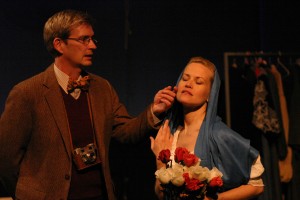 Ensemble work is powerful and strikingly versatile. Perhaps offering the most subtly varied turn is Leffler, who is a bit of a brute in the Elizabethan times, idealistically wrongheaded in the Nazi act, and beautifully, touchingly damaged in the Vietnam era. As the actress playing the Virgin Mary, Barton offers a performance full of complexity and contrasts: She’s sweetly, innocently sexy in the Elizabeth era, a disturbingly ruthless femme fatale in Germany, and an increasingly brittle housewife in the 20th century sequences.
Ensemble work is powerful and strikingly versatile. Perhaps offering the most subtly varied turn is Leffler, who is a bit of a brute in the Elizabethan times, idealistically wrongheaded in the Nazi act, and beautifully, touchingly damaged in the Vietnam era. As the actress playing the Virgin Mary, Barton offers a performance full of complexity and contrasts: She’s sweetly, innocently sexy in the Elizabeth era, a disturbingly ruthless femme fatale in Germany, and an increasingly brittle housewife in the 20th century sequences.
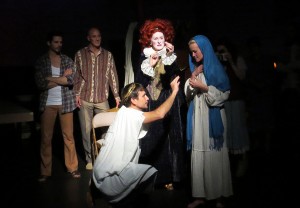 All the other performers offer turns that are equally colorful and varied. But no review of this play would be complete without mention of the stunning cameos offered by Shannon Holt, who appears in each act in a different iconic role, awesomely fierce as a bellicose, merciless Queen Elizabeth, eyes flickering with amused insanity as a Adolph Hitler, and then droolingly childlike as a dim bulb Ronald Reagan. Even in the comparatively brief roles she plays here, Holt’s standout performances are vivid and funny; you’ll want to return to the play just to see her tear up the stage.
All the other performers offer turns that are equally colorful and varied. But no review of this play would be complete without mention of the stunning cameos offered by Shannon Holt, who appears in each act in a different iconic role, awesomely fierce as a bellicose, merciless Queen Elizabeth, eyes flickering with amused insanity as a Adolph Hitler, and then droolingly childlike as a dim bulb Ronald Reagan. Even in the comparatively brief roles she plays here, Holt’s standout performances are vivid and funny; you’ll want to return to the play just to see her tear up the stage.
photos by Enci and Michael Gend
Passion Play
Odyssey Theatre Ensemble and Evidence Room
Odyssey Theatre, 2055 S. Sepulveda Blvd.
scheduled to end on March 16, 2014
for tickets, call (310) 477-2055 or visit www.OdysseyTheatre.com
